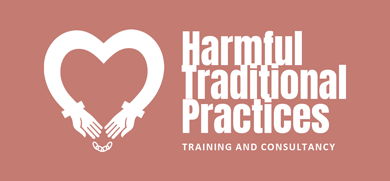What Are Harmful Traditional Practices?
Harmful Traditional Practices (HTPs), also referred to as Harmful Cultural Practices, are forms of violence that have been committed primarily, but not solely against, women and girls in certain communities and societies for so long that they are considered accepted cultural practice. This is how perpetrators may justify harmful traditional practices.
This normalisation makes them particularly difficult to address, which is where our work to challenge HTPs is so vital. Our work helps organisations to address HTPs in their community effectively.
There are hundreds of forms of Harmful Traditional Practice. Not all of them are widely recognised, but their impact can be life changing on the person affected.
As people migrate, they often carry these practices with them, and this can lead to the spread of harmful traditional practices across borders and societies. Our aim is to inform and educate on these issues, to help prevent abuse, violence, and harm, particularly to vulnerable individuals.

This list is not exhaustive. These are the most notable and commonplace examples:
Acts of violence and abuse committed against individuals to protect or defend the perceived honour of a family or community.
A marriage where one or both parties are married without their consent, often under pressure from family or community
A marriage or informal union, where one or both people are under the age of 18.
Removal of, or injury to, any part of female genitalia for non-medical reasons.
Any practice, with or without consent, test or inspection to determine if a woman is a virgin. Hymenoplasty refers to the practice of reconstruction of the hymen, with or without consent.
Where victims of harmful traditional practices are monitored, tracked and controlled.
Where a victim is experiencing fixated, unwanted and repeated behaviours.
Dowry is the money, goods, jewellery or estate that a woman brings to her husband or his family as part of a marriage. Dowry related abuse is any act of violence or harassment associated with the giving or receiving of dowry at any time before, during or after marriage.
Where foetuses are aborted after their sex has been determined, to prevent the mother giving birth to a girl.
Being widowed can result in social isolation and violence in some cultures.
Where some men have multiple wives, this leads to unequal and unfair treatment of women.
Breast flattening (also called breast ironing) is when pubescent girls breasts are damaged over time (sometime over years) to flatten them and delay their development. Sometimes, tools such as spatulas, grinding stones, hot stones, hammers, an elastic belt, or binder, is used to stop them from growing as a means of postponing their development and allegedly guarding girls from rape and other types of unwanted male attention.
Where a marriage is contracted for a limited time as a facade for prostitution or sexual exploitation.
Where Caste is still seen as significant, this form of discrimination and abuse can severely impact someone's life and rights.
When an attacker throws acid at the face or body of their victim, in attempt to permanently scar or disfigure them. Most commonly this occurred when women refused the advances of men, be that marriage proposals or sexual advances, family disputes or as part of torturous domestic abuse or honour-based violence.
Where abuse is justified by cultural beliefs, which then results in severe psychological and physical harm.
Targeting individuals, particularly women, under the guise of witchcraft, leading to violence or social exclusion.
Exclusion of menstruating women from social spaces, often leading to isolation and stigma.
A practice involving cutting or marking the skin to leave permanent scars which is done as a rite of passage into adulthood.
The belief that boys have more value than girls and therefore there is a preference for sons, leading to the deprivation of education, financial support, food rights and in extreme circumstances, to femicide. This is where boys are socialised to be superior to girls.
The act of raping individuals, particularly women, to "correct" their sexual orientation or behaviour or force gender conformity
Violence against individuals who renounce their faith, placing these individuals in extreme danger.
The illegal trade of humans for the purposes of forced labour, sexual slavery, or commercial sexual exploitation.
Where a person is considered owned and exploited for labour, often in a domestic setting, isolated from their own family.
Knowledge is a powerful tool in safeguarding individuals from these harmful practices. By informing communities and organisations, we can help create a safer society.
For more information on how we can assist you, please call, email or fill in the contact form here. We are here to help protect individuals from harmful traditional practices and provide safeguarding consultancy.
